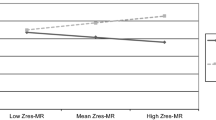Abstract
The purpose of the present study was to evaluate dysfunctional attitudes as a moderator variable in the relationship between negative life events and depression. On the basis of the cognitive model of depression it was predicted that, within a normal college student population, individuals who endorse highly dysfunctional attitudes would be more adversely affected by negative life stress than would their more functional counterparts. Normal and clinical college student groups were administered measures of life events, dysfunctional attitudes, and depression. As expected, in the normal sample, there was a significant interaction between dysfunctional attitudes and negative life stress, which was consistent with the cognitive model of depression. In the clinical sample, the interaction was nonsignificant, and both dysfunctional attitudes and negative life events were found to exert a more direct influence on mood. The implications of these findings for future research were reviewed, along with a suggestion that longitudinal designs might permit a more complete test of the cognitive model.
Similar content being viewed by others
References
Beck, A. T. (1967).Depression: Clinical, experimental, and theoretical aspects. Philadelphia: University of Pennsylvania Press.
Beck, A. T., Rush, A. J., Shaw, B. F., & Emery, G. (1979).Cognitive therapy of depression. New York: Guilford Press.
Bumberry, W., Oliver, J. M., & McClure, J. N. (1978). Validation of the Beck Depression Inventory in a university population using psychiatric estimate as the criterion.Journal of Consulting and Clinical Psychology, 46 150–155.
Habif, V., & Lashley, B. (1980). Assessment of the life stress-depression relationship: The use of social support as a moderator variable.Journal of Behavioral Assessment, 2 167–173.
Halberstadt, L. J., Andrews, D., Metalsky, G. I., & Abramson, L. Y. (1984). Helplessness, hopelessness and depression: A review of progress and future directions. In N. S. Endler & J. M. Hunt (Eds.),Personality and the behavior disorders (Vol. 2, 2nd ed.). New York: Wiley.
Hammen, C. L. (1978). Depression, distortion, and life stress in college students.Cognitive Therapy and Research, 2 189–192.
Johnson, S. H., & Sarason, I. G. (1978). Life stress, depression and anxiety: Internal-external control as a moderator variable.Journal of Psychosomatic Research, 22 205–208.
LaPointe, K. A., & Crandell, C. J. (1980). Relationship of irrational beliefs to self-reported depression.Cognitive Therapy and Research, 4 247–250.
Nuckolls, K. B., Cassel, J., & Kaplan, B. H. (1972). Psychosocial assets, life crisis, and the prognosis of pregnancy.American Journal of Epidemiology, 95 431–441.
Rabkin, J. A., & Struening, E. L. (1976). Life events, stress, and illness.Science, 194 1012–1020.
Sarason, I. G., Johnson, J. H., & Siegel, J. M. (1978). Assessing the impact of life changes: Development of the Life Experiences Survey.Journal of Consulting and Clinical Psychology, 46 932–946.
Smith, R. E., Johnson, J. H., & Sarason, I. G. (1978). Life change, the sensation seeking motive, and psychological distress.Journal of Consulting and Clinical Psychology, 46 348–349.
Uhlenhuth, E. H., & Paykel, E. S. (1973). Symptom intensity and life events.Archives of General Psychiatry, 28 473–477.
Weisseman, A., & Beck, A. T. (1978, November).Development and validation of the Dysfunctional Attitude Scale (DAS). Paper presented at the 12th annual meeting of the Association for the Advancement of Behavior Therapy, Chicago.
Author information
Authors and Affiliations
Rights and permissions
About this article
Cite this article
Wise, E.H., Barnes, D.R. The relationship among life events, dysfunctional attitudes, and depression. Cogn Ther Res 10, 257–266 (1986). https://doi.org/10.1007/BF01173730
Issue Date:
DOI: https://doi.org/10.1007/BF01173730




